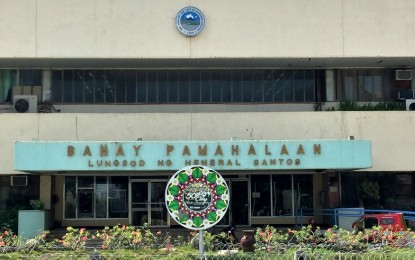
The General Santos City Hall building. (PNA GenSan file photo)
GENERAL SANTOS CITY -- The city government has raised concern over the increasing cases of absenteeism and habitual tardiness among its employees.
Lawyer Doan Balboa, executive assistant of the City Mayor’s Office, said Thursday they uncovered the problem in the wake of an ongoing review of the daily time records (DTRs) of all city employees.
Balboa said they are currently identifying employees who have logged numerous unauthorized absences and tardiness.
“This is a major concern for us since it will eventually affect the delivery of services in our offices,” she said in an interview.
Citing a directive from Mayor Ronnel Rivera, Balboa said they reminded all city government employees on the strict implementation of Civil Service Commission Memorandum Circular No. 1, series of 2017.
The memorandum reiterates the policy on government office hours, administrative offenses of frequent unauthorized absences, tardiness in reporting for duty and loafing from duty during regular office hours.
“We reiterated the memo to our employees. We’re initially focusing on stopping habitual tardiness, especially those who have been late in reporting to work for 10 or more times in a month,” Balboa said.
She said they are also checking workers who have gone absent from work without informing their department heads or immediate supervisors.
Balboa said that after completing the list of the erring employees, the Human Resource Management Division will summon and give them a chance to explain as part of due process.
She said they will then schedule hearings, which is targeted to start in two weeks, for the concerned employees and their department heads.
Under CSC regulations, she said absenteeism and habitual tardiness are serious offenses that could lead to suspensions and even the dismissal of an employee.
“For the first offense, they will get a reprimand as penalty. But the succeeding offenses will be met with heavier sanctions,” she added. (PNA)
